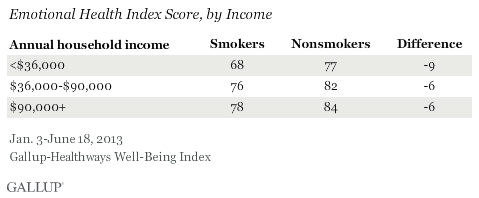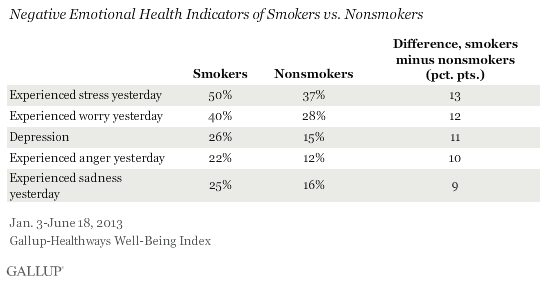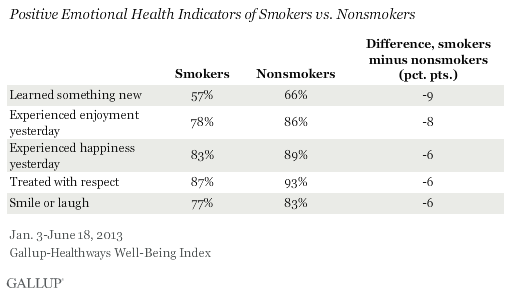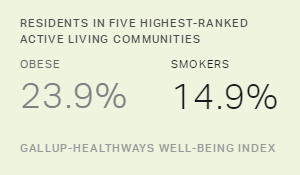WASHINGTON, DC -- Americans who smoke are in worse emotional health than are those who do not smoke. Smokers have an average Emotional Health Index Score of 72.0, much lower than the average of 81.1 for nonsmokers.

These findings are based on more than 83,000 interviews conducted Jan. 3-June 18, 2013, with Americans aged 18 and older, collected as part of the Gallup-Healthways Well-Being Index. The Emotional Health Index is a subcomponent of the overall index and includes 10 items, asking respondents whether they experienced the following "during a lot of the day yesterday": smiling or laughter, learning or doing something interesting, being treated with respect, enjoyment, happiness, worry, sadness, anger, and stress -- and clinical diagnosis of depression.
Regardless of Income, Smokers Still Worse Off Emotionally
Americans in poverty are more likely to smoke compared with those who are not in poverty, 33% vs. 19.9%, and smokers are more likely to have depression and other chronic health problems. But smokers, regardless of their income level, report worse emotional health than those who do not smoke. This means that socioeconomic status alone does not account for the differences in emotional health between smokers and nonsmokers; rather there is something else about being a smoker that relates to having worse emotional health.
Smokers in the lowest income group do seem to suffer the most emotionally, though, compared with nonsmokers in the same income bracket.

Smokers More Likely to Experience Stress, Worry, and Depression
Smokers are much more likely than nonsmokers to report feeling stressed a lot of the day "yesterday" -- 50% vs. 37%. Smokers are also more likely than nonsmokers to say they experienced worry, anger, and sadness a lot of the day "yesterday."
It is not clear whether experiencing these negative emotions leads people to start or continue smoking, or whether the act of smoking makes smokers more likely to report experiencing these negative emotions.
Additionally, smokers are more likely than nonsmokers to report having ever been clinically diagnosed with depression, 26% vs. 15%, respectively.

Smokers Less Likely to Feel Positive Emotions, Be Treated With Respect
Smokers are less likely than nonsmokers to report experiencing positive emotions -- including enjoyment, happiness, and smiling or laugher. Additionally, smokers are also less likely than those who do not smoke to say they learned or did something new "yesterday" -- 57% vs. 66%.
Smokers are also less likely than nonsmokers to say they were treated with respect "yesterday." Gallup has found that one in four Americans have less respect for smokers, and this social disapproval may negatively affect how smokers are actually treated or how they perceive they are treated.

Bottom Line
Smoking rates continue to decline in the U.S., with 19.1% of Americans currently reporting that they smoke -- a much lower rate than what Gallup has found in other surveys conducted since 1944. Still, smoking continues to be a costly problem for individuals and the overall economy. According to the CDC, smoking-related illness in the U.S. costs $96 billion in medical costs and $97 billion in lost productivity each year.
With nearly nine in 10 smokers expressing regret that they ever started smoking, it is worth noting that smoking is a preventable lifestyle choice and one that can negatively affect a person's emotional well-being. Smokers are more likely than nonsmokers to experience negative emotions, including stress, worry, and sadness, but whether these negative emotions lead to smoking -- or the other way around -- remains unclear.
About the Gallup-Healthways Well-Being Index
The Gallup-Healthways Well-Being Index tracks well-being in the U.S. and provides best-in-class solutions for a healthier world. To learn more, please visit well-beingindex.com.
Survey Methods
Results are based on telephone interviews conducted as part of the Gallup Healthways Well-Being Index survey Jan. 3-June 18, 2013, with a random sample of 83,443 adults, aged 18 and older, living in all 50 U.S. states and the District of Columbia.
For results based on the total sample of national adults, one can say with 95% confidence that the maximum margin of sampling error is ±0.21 percentage points.
For results based on the total sample of smoking population, one can say with 95% confidence that the maximum margin of sampling error is ±1.09 percentage points.
Interviews are conducted with respondents on landline telephones and cellular phones, with interviews conducted in Spanish for respondents who are primarily Spanish-speaking. Each sample includes a minimum quota of 400 cell phone respondents and 600 landline respondents per 1,000 national adults, with additional minimum quotas among landline respondents by region. Landline telephone numbers are chosen at random among listed telephone numbers. Cell phones numbers are selected using random digit dial methods. Landline respondents are chosen at random within each household on the basis of which member had the most recent birthday.
Samples are weighted by gender, age, race, Hispanic ethnicity, education, region, adults in the household, and phone status (cell phone-only/landline only/both, cell phone mostly, and having an unlisted landline number). Demographic weighting targets are based on the March 2011 Current Population Survey figures for the aged 18 and older non-institutionalized population living in U.S. telephone households. All reported margins of sampling error include the computed design effects for weighting and sample design.
In addition to sampling error, question wording and practical difficulties in conducting surveys can introduce error or bias into the findings of public opinion polls.
For more details on Gallup's polling methodology, visit www.gallup.com.
